
PHYTOPROTECTION
Scope & Guideline
Cultivating Knowledge in Plant Health
Introduction
Aims and Scopes
- Integrated Pest Management (IPM):
The journal emphasizes research on integrated pest management strategies that combine biological, chemical, and cultural practices to minimize pest damage and promote sustainable agriculture. - Plant Pathology:
Research articles frequently cover the biology, diagnosis, and control of plant pathogens, providing insights into managing diseases affecting various crops. - Entomology and Insect Management:
The journal explores the role of insects in agriculture, focusing on both harmful pests and beneficial insects, and their management through biological control and other innovative methods. - Natural Products and Biopesticides:
There is a consistent focus on the extraction and application of natural compounds from plants and other organisms as environmentally friendly alternatives to synthetic pesticides. - Crop Physiology and Stress Responses:
Research on how plants respond to abiotic stresses (like drought) and biotic stresses (like pest infestations) is a significant area of study, emphasizing resilience and adaptation strategies. - Sustainable Agricultural Practices:
The journal promotes research on sustainable practices that enhance soil health and ecosystem balance, including the use of cover crops and organic amendments.
Trending and Emerging
- Utilization of Artificial Intelligence (AI):
Emerging applications of AI in phytoprotection, particularly in pest management and disease prediction, are becoming increasingly prominent, pointing to a technological shift in the field. - Metabolomics in Plant Health:
The integration of metabolomics to understand plant-pathogen interactions and improve disease resistance is gaining traction, indicating a trend towards more biochemical approaches in plant protection. - Biological Control Agents:
Research focusing on the use of biological control agents, including beneficial insects and microbial antagonists, is on the rise, reflecting a growing interest in sustainable pest management solutions. - Phytochemicals and Plant Extracts:
There is an increasing focus on the efficacy of phytochemicals and plant extracts as biopesticides, highlighting a shift towards natural product research in pest control. - Climate Change Impact Studies:
Investigations into how climate change affects pest dynamics and plant health are emerging as a critical area of research, emphasizing the need for adaptive management strategies.
Declining or Waning
- Chemical Pesticide Research:
There has been a noticeable decrease in studies focused solely on synthetic chemical pesticides, reflecting a shift towards more sustainable and environmentally friendly pest management strategies. - Traditional Agricultural Practices:
Research centered around traditional farming methods and practices appears to be diminishing, as newer and more innovative approaches to pest and disease management gain traction. - Standalone Laboratory Studies:
The trend of publishing isolated laboratory studies without practical field applications or implications is declining, as the journal increasingly favors research with real-world applicability.
Similar Journals

JOURNAL OF HORTICULTURAL SCIENCE & BIOTECHNOLOGY
Cultivating knowledge at the intersection of science and biotechnology.JOURNAL OF HORTICULTURAL SCIENCE & BIOTECHNOLOGY, published by Taylor & Francis Ltd, stands as a prestigious platform in the realms of both horticulture and biotechnology. With an ISSN of 1462-0316 and an E-ISSN of 2380-4084, this journal showcases cutting-edge research that advances our understanding of plant science and genetic innovation. Operating under the publication umbrella from 1996 to 2024, the journal has achieved notable rankings, placing in the Q3 quartile for Genetics and Q2 for Horticulture in 2023. With a Scopus ranking of #25/115 in Agricultural and Biological Sciences (Horticulture) and a respectable 78th percentile, it is highly regarded among researchers and professionals alike. While currently not designated as Open Access, the journal remains crucial for academics keen on disseminating groundbreaking findings and techniques that foster advancements in agricultural productivity and sustainability. As an essential resource for researchers, professionals, and students, JOURNAL OF HORTICULTURAL SCIENCE & BIOTECHNOLOGY not only facilitates knowledge sharing within its community but also serves as a vital reference point for future innovations in the field.

Horticultural Science & Technology
Nurturing the growth of global horticultural expertise.Horticultural Science & Technology is a leading journal in the field of horticulture, published by the Korean Society of Horticultural Science. With an ISSN of 1226-8763 and an E-ISSN of 2465-8588, it serves as a critical platform for disseminating cutting-edge research and advancements in horticultural science worldwide. The journal holds a prestigious Q2 category ranking in Horticulture for 2023, placing it among the top half of its field, as reflected by its Scopus rank of #56 out of 115. Operating from South Korea and backed by institutional affiliations with the National Institute of Horticultural & Herbal Science, the journal aims to promote innovative agricultural practices and sustainable horticultural techniques. Its open-access model ensures that research findings are readily available to both professionals and academics, fostering collaboration and knowledge sharing in the global horticultural community. As it continues to evolve through its converged years from 2008 to 2024, Horticultural Science & Technology remains an invaluable resource for scholars, practitioners, and students dedicated to advancing the art and science of horticulture.

ACTA AGROBOTANICA
Pioneering research in agronomy and ecological sustainability.ACTA AGROBOTANICA, published by Polskie Towarzystwo Botaniczne, serves as a premier open-access journal in the fields of Agronomy, Ecology, and Plant Sciences. Established in 1953, this journal presents a rich history of scholarly contributions, showcasing significant research findings and advances within the botanical domain. Operating under an Open Access model since its inception, ACTA AGROBOTANICA fosters accessibility and dissemination of knowledge, crucial for researchers, professionals, and students alike. The journal currently holds a respectable Q3 ranking in prominent categories such as Agronomy and Crop Science, Ecology, Evolution, Behavior and Systematics, and Plant Science as of 2023, reflecting its growing impact within the scientific community. With a dedication to exploring diverse botanical issues in Poland and beyond, this journal remains a valuable platform for innovative research and critical discourse in botany.

Bioagro
Exploring innovative research for a greener future.Bioagro is an esteemed academic journal dedicated to advancing research in the field of Agricultural and Biological Sciences. Published by the University Centroccidental Lisandro Alvarado in Venezuela, this journal has made significant strides since its inception in 2008, with a focus on delivering high-quality research publications that address contemporary challenges in agriculture and biology. Recognized for its contributions, it holds a Q3 ranking in the Agricultural and Biological Sciences (miscellaneous) category as of 2023, and it ranks #125 out of 221 in its field, placing it in the 43rd percentile. Although it operates on an Open Access model, Bioagro strives to provide broad access to innovative research, thereby fostering collaboration and knowledge dissemination among researchers, professionals, and students. With a commitment to include a wide range of topics, the journal aims to be a pivotal platform for exploration and dialogue in agricultural sciences, ensuring that key findings reach both scientific and practitioner audiences. Located in Barquisimeto-Cabudare, Lara, Venezuela, Bioagro invites submissions that contribute to the global discourse on sustainable practices and innovations in agriculture.
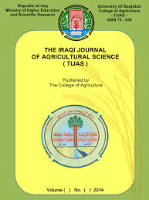
Iraqi Journal of Agricultural Sciences
Empowering scholars to transform agricultural practices.The Iraqi Journal of Agricultural Sciences, published by the College of Agricultural Engineering Sciences, University of Baghdad, is a prominent open-access journal that has been disseminating valuable research in the fields of agricultural and biological sciences since 2005. With an ISSN of 0075-0530 and an E-ISSN of 2410-0862, this journal serves as an essential platform for scholars to share their findings and advancements in various disciplines, including animal science, horticulture, and food science. Recognized for its excellence, the journal achieved Q1 ranking in multiple categories, reflecting its significant contribution to the scientific community and its impact within Scopus rankings. It is particularly dedicated to fostering research that addresses local and global agricultural challenges and promotes sustainable practices in Iraq and beyond. As a pivotal resource for researchers, professionals, and students alike, the Iraqi Journal of Agricultural Sciences invites submissions that advance our understanding of agricultural sciences while supporting the open dissemination of knowledge in this vital sector.
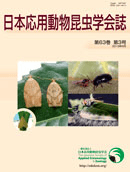
JAPANESE JOURNAL OF APPLIED ENTOMOLOGY AND ZOOLOGY
Innovating for Sustainable Pest ManagementJapanese Journal of Applied Entomology and Zoology is a premier publication in the field of Insect Science, offering a platform for researchers and practitioners to share their findings on applied entomology and zoology. Established in 1957 and published by the Japan Society of Applied Entomology and Zoology, this journal aims to foster the understanding of insect-related studies that impact agriculture, ecology, and biodiversity. With an ISSN of 0021-4914 and E-ISSN of 1347-6068, it serves as a crucial resource for both academics and industry professionals. While the journal currently resides in the Q4 category of the Scopus ranking for Insect Science with a percentile of 11th, it plays a significant role in providing valuable insights into insect behavior, systematics, and their ecological roles. Readers can benefit from its published research to drive innovations and solutions in pest management and conservation practices. As the journal continues to evolve, it reinforces its commitment to disseminating critical research that supports sustainable practices in entomology and zoology through its convergence extending to the year 2024.
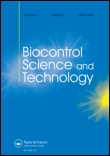
BIOCONTROL SCIENCE AND TECHNOLOGY
Innovating Biocontrol Strategies for a Sustainable FutureBIOCONTROL SCIENCE AND TECHNOLOGY is a premier, peer-reviewed journal published by Taylor & Francis Ltd that specializes in the dynamic fields of Agronomy and Insect Science. Established in 1991, this journal has garnered a reputation for disseminating high-quality, impactful research with an impressive 2023 Scopus rank of 53 out of 181 in Insect Science and 153 out of 406 in Agronomy, placing it in the Q2 category for both fields. With its ISSN 0958-3157 and E-ISSN 1360-0478, the journal serves as a vital resource for researchers, professionals, and students dedicated to advancing understanding and innovation in pest management and biocontrol strategies. Although not an open-access journal, it offers comprehensive insights that are crucial for professionals aiming to tackle agricultural challenges and enhance food security. The journal’s continuous coverage from 1991 to 2024 ensures that it remains at the forefront of significant advancements in biocontrol, making it an essential read for anyone interested in sustainable agricultural practices and integrated pest management.
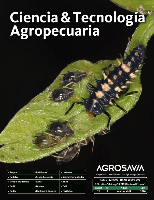
Revista Corpoica-Ciencia y Tecnologia Agropecuaria
Connecting Researchers to Revolutionize Agro-Science.Revista Corpoica-Ciencia y Tecnologia Agropecuaria is a premier open access journal dedicated to the dissemination of innovative research in the field of agricultural and biological sciences. Published by CORP COLOMBIANA INVESTIGACION AGROPECUARIA-CORPOICA, this journal has been a key resource for professionals and academics since its inception in 1996, providing valuable insights into the challenges and advancements in agro-technology. As a recognized journal with a Q3 ranking in its category for 2023, it operates with a mission to enhance knowledge transfer and foster collaboration among researchers in Colombia and beyond. The journal is indexed in Scopus, which highlights its commitment to maintaining rigorous academic standards and broadening the scope of agricultural research. With an emphasis on advancing sustainable agricultural practices and technological innovations, Revista Corpoica serves as an essential platform for sharing groundbreaking studies, reviews, and original research that contribute to the growing body of agricultural knowledge. Researchers, professionals, and students alike will find this journal an invaluable tool to stay informed and engaged with the latest advancements in agricultural science.
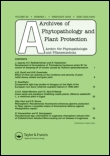
ARCHIVES OF PHYTOPATHOLOGY AND PLANT PROTECTION
Uncovering Insights to Protect Our Crops and EnvironmentArchives of Phytopathology and Plant Protection, published by Taylor & Francis Ltd, stands as a pivotal platform in the field of agronomy and crop science since its inception in 1974. With an ISSN of 0323-5408 and E-ISSN of 1477-2906, this journal is dedicated to publishing high-quality, peer-reviewed research that addresses contemporary challenges in plant pathology and protection. As a Q3 ranked journal in its category with Scopus Rank #210/406, it serves a vital role in disseminating practical solutions and innovative discoveries to enhance agricultural productivity and sustainability. The journal fosters a rich exchange of ideas among researchers, professionals, and students, empowering them to contribute to the advancement of the agronomy and biological sciences. Despite being traditionally subscription-based, the journal's commitment to comprehensive and rigorous research makes it an essential resource for anyone invested in the future of plant health and agricultural innovation.
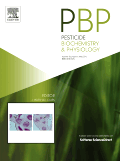
Pesticide Biochemistry and Physiology
Uncovering the physiological impacts of pesticides for a safer ecosystem.Pesticide Biochemistry and Physiology, published by Academic Press Inc Elsevier Science, is a prominent peer-reviewed journal dedicated to advancing knowledge in the fields of agronomy, crop science, and the toxicological effects of pesticides. With an established history since 1971, this journal aims to provide a platform for researchers and professionals to share groundbreaking studies that bridge the gap between agricultural practices and environmental health. Holding a remarkable Q1 ranking in both Agronomy and Crop Science as well as Health, Toxicology, and Mutagenesis, it reflects the journal's commitment to high-quality research. The journal is essential reading for anyone involved in the sustainability of agricultural ecosystems, offering insights into the biochemical interactions of pesticides and their physiological impacts on various crops and non-target organisms. As the global demand for sustainable agricultural practices escalates, Pesticide Biochemistry and Physiology remains at the forefront, promoting innovative research to ensure both food security and environmental safety. Converged through an extensive range of studies, this journal is a valuable resource for researchers, professionals, and students aiming to make significant contributions to the evolving landscape of pesticide biochemistry.